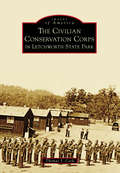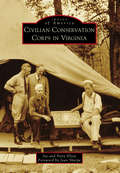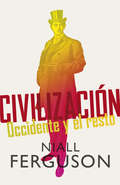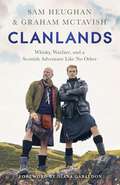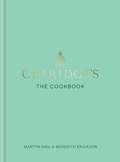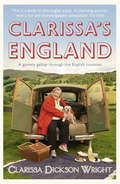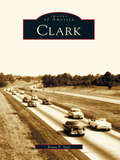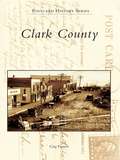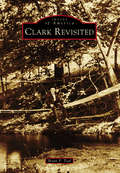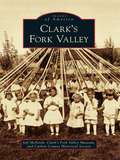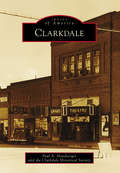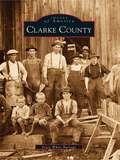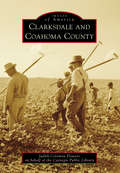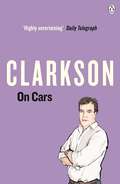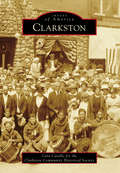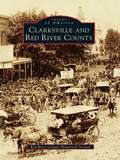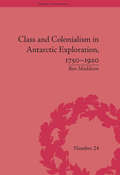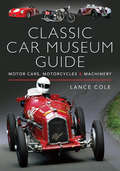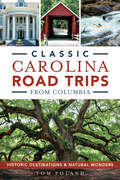- Table View
- List View
Civilian Conservation Corps in Letchworth State Park, The
by Thomas S. CookLetchworth State Park, located in the Genesee Valley of western New York State, is renowned for its natural beauty, scenic roads, trails, and recreational facilities. Created from the private estate of William Pryor Letchworth in 1907, the park quickly grew in size and popularity. A series of ambitious expansion and development plans were under way when the Great Depression struck, threatening the park's future. That future was restored when President Roosevelt's Civilian Conservation Corps brought hundreds of young men to the four CCC camps established in the park. From 1933 to 1941, they worked on cabins, roads, and other projects, while strengthening their bodies, minds, and futures. Their legacy is still enjoyed by thousands of park visitors today. The Civilian Conservation Corps in Letchworth State Park explores the stories of these camps, as well as the CCC "boys" and their legacy, through vintage photographs, camp and area newspapers, official reports, and the memories of CCC veterans.
Civilian Conservation Corps in Virginia (Images of America)
by Joe Foreword By Sharpe Patty EltonIn 1933, the United States was struggling to survive the Great Depression. Pres. Franklin D. Roosevelt promised a “New Deal” to put the nation back to work. The Civilian Conservation Corps (CCC) was launched in Virginia’s Blue Ridge Mountains, where the first camp, Camp Roosevelt, was built. The CCC was widely acclaimed as the most popular of Roosevelt’s programs. In Virginia, CCC workers built Shenandoah National Park, the Blue Ridge Parkway, the first six state parks, and more. Despite the program’s success, senators from Virginia led the Congressional efforts to kill the CCC in 1942.
Civilización
by Niall FergusonSi nos embarcáramos en un viaje alrededor del mundo en 1411, lo más interesante sería ser testigos del desarrollo de las brillantes civilizaciones orientales. La Ciudad Prohibida estaba en plena construcción en el Pekín de los Ming, y en Oriente Próximo los otomanos acechaban Constantinopla. En contraste, Europa occidental se encontraba sumida en guerras constantes y estaba debilitada por plagas, falta de higiene y sistemas políticos que dificultaban su apertura. La idea de que Occidente iba a dominar al resto del mundo durante el siguiente medio milenio hubiera parecido ilusoria en esos momentos. Y sin embargo, ocurrió. ¿Qué tenía la civilización de Europa Occidental que le permitió dominar a los superiores imperios orientales? La respuesta, para Niall Ferguson, estriba en que Occidente logró desarrollar seis poderosas herramientas de las que el resto carecía: competencia, ciencia, democracia, medicina, consumismo y la ética del trabajo. La cuestión es si actualmente Occidente ha perdido su monopolio sobre estas seis cuestiones. Si fuera así, podríamos estar viviendo el fin de la supremacía occidental.
Clanlands: Whisky, Warfare, and a Scottish Adventure Like No Other
by Sam Heughan Graham McTavishTHE SUNDAY TIMES BESTSELLERWith a foreword by Diana Gabaldon. Two men. One country. And a lot of whisky.As stars of Outlander, Sam and Graham eat, sleep and breathe the Highlands on this epic road trip around their homeland. They discover that the real thing is even greater than fiction. Clanlands is the story of their journey. Armed with their trusty campervan and a sturdy friendship, these two Scotsmen are on the adventure of a lifetime to explore the majesty of Scotland. A wild ride by boat, kayak, bicycle and motorbike, they travel from coast to loch and peak to valley and delve into Scotland's history and culture, from timeless poetry to bloody warfare. With near-death experiences, many weeks in a confined space together, and a cast of unforgettable characters, Graham and Sam's friendship matures like a fine Scotch. They reflect on their acting careers in film and theatre, find a new awestruck respect for their native country and, as with any good road trip, they even find themselves. Hold onto your kilts... this is Scotland as you've never seen it before.
Clanlands: Whisky, Warfare, and a Scottish Adventure Like No Other
by Sam Heughan Graham McTavishTHE SUNDAY TIMES BESTSELLERWith a foreword by Diana Gabaldon. Two men. One country. And a lot of whisky.As stars of Outlander, Sam and Graham eat, sleep and breathe the Highlands on this epic road trip around their homeland. They discover that the real thing is even greater than fiction. Clanlands is the story of their journey. Armed with their trusty campervan and a sturdy friendship, these two Scotsmen are on the adventure of a lifetime to explore the majesty of Scotland. A wild ride by boat, kayak, bicycle and motorbike, they travel from coast to loch and peak to valley and delve into Scotland's history and culture, from timeless poetry to bloody warfare. With near-death experiences, many weeks in a confined space together, and a cast of unforgettable characters, Graham and Sam's friendship matures like a fine Scotch. They reflect on their acting careers in film and theatre, find a new awestruck respect for their native country and, as with any good road trip, they even find themselves. Hold onto your kilts... this is Scotland as you've never seen it before.
Claridge's – The Cocktail Book
by Claridge's'...Not that I intend to die, but when I do, I don't want to go to heaven, I want to go to Claridge's' - Spencer Tracy 'When I pass through the revolving doors into the glamorous lobby of Claridge's in London, I always feel a thrill. You enter a world of sophistication and wonderful service... Claridge's is my ultimate treat' - Lulu GuinnessThis glorious guide contains all the inspiration you'll need for the cocktail hour, with a spirited - and no/low - selection of more than 500 recipes suitable for every occasion. Whatever your tastes and wherever your location, this new bartender's bible will enable you to share the magic of Claridge's with family and friends, from your own cocktail cabinet. Co-authored by Denis Broci (Director of Bars) and Nathan McCarley-O'Neill (Director of Mixology), this handsome volume encompasses classics from every period in Claridge's history, new inventions that reflect the evolution of the art of drink-making and drinks of every style from every elegant space within this grand institution. Whether you prefer something sparkling, sweet, stirred, complex, sharp, refreshing, bracing or sour, an inviting glass awaits.CONTENTS INCLUDES:Champagne & Sparkling Featuring Champagne cobbler, French 75 and Gimlet royaleStirred & ComplexFeaturing Oaxacan old fashioned, Silver bullet martini and Widows' kissShort & SharpFeaturing Between the sheets, Gin basil smash and London callingLong & RefreshingFeaturing Peachblow fizz, Singapore sling and Tom CollinsNo & LowFeaturing Adonis, Diplomat and Rome with a view
Claridge's – The Cocktail Book
by Claridge's'...Not that I intend to die, but when I do, I don't want to go to heaven, I want to go to Claridge's' - Spencer Tracy 'When I pass through the revolving doors into the glamorous lobby of Claridge's in London, I always feel a thrill. You enter a world of sophistication and wonderful service... Claridge's is my ultimate treat' - Lulu GuinnessThis glorious guide contains all the inspiration you'll need for the cocktail hour, with a spirited - and no/low - selection of more than 500 recipes suitable for every occasion. Whatever your tastes and wherever your location, this new bartender's bible will enable you to share the magic of Claridge's with family and friends, from your own cocktail cabinet. Co-authored by Denis Broci (Director of Bars) and Nathan McCarley-O'Neill (Director of Mixology), this handsome volume encompasses classics from every period in Claridge's history, new inventions that reflect the evolution of the art of drink-making and drinks of every style from every elegant space within this grand institution. Whether you prefer something sparkling, sweet, stirred, complex, sharp, refreshing, bracing or sour, an inviting glass awaits.CONTENTS INCLUDES:Champagne & Sparkling Featuring Champagne cobbler, French 75 and Gimlet royaleStirred & ComplexFeaturing Oaxacan old fashioned, Silver bullet martini and Widows' kissShort & SharpFeaturing Between the sheets, Gin basil smash and London callingLong & RefreshingFeaturing Peachblow fizz, Singapore sling and Tom CollinsNo & LowFeaturing Adonis, Diplomat and Rome with a view
Claridge's: The Cookbook
by Meredith Erickson Martyn Nail"Claridge's: The Cookbook is a sophisticated addition to your cookbook collection - and a purse-friendly alternative to an overnight stay." Stylist "...not that I intend to die, but when I do, I don't want to go to heaven, I want to go to Claridge's" Spencer Tracy "I love to check myself into Claridge's now and then for a few nights - just to spoil myself" Jade Jagger "When I pass through the revolving doors into the glamorous lobby of Claridge's in London, I always feel a thrill. You enter a world of sophistication and wonderful service... Claridge's is my ultimate treat." Lulu Guinness "It's the best in the world" Alex James An art deco jewel set in the heart of London's Mayfair, Claridge's - one of the world's best luxury hotels - has long been known for inspiring menus and exceptional dining from breakfasts and elevenses, through lunch and afternoon tea, and on to drinks, dinner and the dessert cart. Claridge's: The Cookbook celebrates that heritage in style, with a collection of over 100 of the best-loved dishes and drinks from The Foyer and Reading Room, the Bar and The Fumoir. With interludes ranging from the magic of Christmas to how to host dinner for 100, the extraordinary experience of dining at Claridge's is brought to life in book form. The book will include delectable dishes and drinks for every time of day: from the Arnold Bennett omelette, to the Lobster, langoustine & crab cocktail and the Smoked duck salad. Treats include Cheddar Eccles cakes and a Raspberry marshmallow. Savour everything from the prized Claridge's chicken pie to a slice of Venison Wellington, with some Truffled macaroni gratin or Pommes château. Share the essence of Claridge's with family and friends, in the comfort of your own home - and enjoy!
Claridge's: The Cookbook
by Meredith Erickson Martyn Nail"...not that I intend to die, but when I do, I don't want to go to heaven, I want to go to Claridge's" Spencer Tracy "I love to check myself into Claridge's now and then for a few nights - just to spoil myself" Jade Jagger "When I pass through the revolving doors into the glamorous lobby of Claridge's in London, I always feel a thrill. You enter a world of sophistication and wonderful service... Claridge's is my ultimate treat." Lulu Guinness"It's the best in the world" Alex JamesAn art deco jewel set in the heart of London's Mayfair, Claridge's - one of the world's best luxury hotels - has long been known for inspiring menus and exceptional dining from breakfasts and elevenses, through lunch and afternoon tea, and on to drinks, dinner and the dessert cart. Claridge's: The Cookbook celebrates that heritage in style, with a collection of over 100 of the best-loved dishes and drinks from The Foyer and Reading Room, the Bar and The Fumoir. With interludes ranging from the magic of Christmas to how to host dinner for 100, the extraordinary experience of dining at Claridge's is brought to life in book form. The book will include delectable dishes and drinks for every time of day: from the Arnold Bennett omelette, to the Lobster, langoustine & crab cocktail and the Smoked duck salad. Treats include Cheddar Eccles cakes and a Raspberry marshmallow. Savour everything from the prized Claridge's chicken pie to a slice of Venison Wellington, with some Truffled macaroni gratin or Pommes château. Share the essence of Claridge's with family and friends, in the comfort of your own home - and enjoy!
Clarissa's England: A Gamely Gallop Through the English Counties
by Clarissa Dickson WrightThe quintessential Englishwoman Clarissa Dickson Wright, one of the Two Fat Ladies and author of Spilling the Beans, takes us on a personal journey through the country of her birth.From Cornwall to Cumbria, Norfolk to Northumbria she brings her extraordinary knowledge, huge passion, forthright opinions and inimitable wit to the distinctive history and regional character of every corner of England.In her cornucopia of local knowledge she reveals, for example, how Boudicca was the original Essex girl, that Lincolnshire has a coriander crop second only in size to India's, and just why a Cornish pasty should never contain carrots.As much an entertaining narrative as it is a travel companion, Clarissa's England will amuse, enlighten, surprise and delight all those who read it.
Clarissa's England: A gamely gallop through the English counties
by Clarissa Dickson WrightThe quintessential Englishwoman Clarissa Dickson Wright, one of the Two Fat Ladies and author of Spilling the Beans, takes us on a personal journey through the country of her birth.From Cornwall to Cumbria, Norfolk to Northumbria she brings her extraordinary knowledge, huge passion, forthright opinions and inimitable wit to the distinctive history and regional character of every corner of England.In her cornucopia of local knowledge she reveals, for example, how Boudicca was the original Essex girl, that Lincolnshire has a coriander crop second only in size to India's, and just why a Cornish pasty should never contain carrots.As much an entertaining narrative as it is a travel companion, Clarissa's England will amuse, enlighten, surprise and delight all those who read it.
Clark (Images of America)
by Brian P. ToalClark explores a community with a history dating from 1864, the height of the Civil War. Accessed by Exit 135 on the Garden State Parkway, Clark was originally the Fifth Ward of Rahway until a group of disgruntled farmers, led by founding fathers Robert A. Russell, William Bloodgood, William H. Enders, Smith Woodruff, and Judge Hugh H. Bowne, declared its independence and established a self-governing township. The men named the town for a local American patriot and signer of the Declaration of Independence, Abraham Clark. The vintage photographs included here represent Clark's history from its days as a rural farm town of the nineteenth and early twentieth centuries to its current status as a thriving suburban community.
Clark County
by Greg FurnessClark County was created in 1873 by an act of territorial legislature. It was named for Newton Clark, a territorial legislator. On June 27, 1878, the first white settlers arrived in Clark County. Settlers continued migrating to Clark County, and by 1880, there were enough settlers to petition for organization. On May 23, 1881, Clark County became an official county. The first courthouse was built in 1888 in Clark. Besides Clark, the following towns were soon formed: Bradley, Carpenter, Crocker, Elrod, Garden City, Melham, Naples, Raymond, Vienna, and Willow Lake. Clark County, located in northeast South Dakota in the Glacial Lakes and Prairie Region, is home to some 4,500 residents.
Clark Revisited
by Brian P. ToalClark Revisited takes a second look at the past of a community whose humble beginnings can be traced back to the height of the Civil War. Located in Central New Jersey, the township of Clark began as a quiet agricultural community. But with the 20th century came many changes, and the development of the Garden State Parkway became a catalyst for Clark's transition into a community with housing developments, businesses, and a renewed image. These changes can be largely attributed to land developers, as well as the leadership of mayors who have served Clark over the last half of the century. New Jersey Monthly magazine has credited Clark as one of the best places to live in New Jersey. What was once rural farmland has grown into a thriving, suburban community that continues to develop both socially and economically.
Clark's Fork Valley (Images of America)
by Jeff Mcneish Carbon County Historical Society Clark’s Fork Valley MuseumMany of the great icons of western American history left their mark on Carbon County while living in or traveling through the natural byway that is Montana's Clark's Fork Valley. The Apsáalooke, or Crow, people called the valley home for centuries. The Lewis and Clark expedition recorded and named the valley's river in 1806. In 1807-1808, John Colter, the discoverer of Yellowstone Park, explored the southern end of the valley. The Rocky Mountain Fur Company and adventurers like Jedediah Smith, Joe Meek, and Thomas Fitzpatrick soon followed. In 1864, Jim Bridger blazed the Bridger Trail through the valley. Chief Joseph and his band of Nez Perce followed the valley north from Yellowstone Park during their 1877 flight toward Canada. Calamity Jane and Caroline Lockhart, a noted author and literary rival of Zane Grey, once called the valley home, and Buffalo Bill Cody and John "Liver-Eating" Johnston visited it frequently.
Clarkdale
by Clarkdale Historical Society Paul A. HandvergerClarkdale is recognized as a "Place of History" in the National Register of Historic Places, possessing both historical and architectural significance. Clarkdale's story began eons ago with the creation of its natural environment. The first people came thousands of years ago to this lush land, followed by subsequent cultures that made use of the abundant water, rich soil, and moderate climate. In the early 20th century, mining magnate William Clark built the smelter company town of Clarkdale; the agricultural age was soon replaced by the industrial age. Clark became one of the wealthiest men in America, with most of his money coming from the output of Clarkdale's smelter. Since the smelter closure in 1953, the former workers' homes, smelter site, and company lands have been recycled into today's homes, a tourist destination, and a place of museums, education, and the arts, all located within a spectacular environment of mountains and river. This book presents that story.
Clarke County
by Joyce White BurrageClarke County is a beautifully wooded and peaceful spot in west Alabama with a long and rich history.Bounded on the east by the Alabama River and on thewest by the Tombigbee River, Clarke County's richtimberlands serve as the source for pine timber markets throughout the world. The fantastic hunting and fishing in the county are known throughout the South. Clarke County's history includes the story of the Mitcham War, a period of unrest in 1893 that reached state-wide proportions in notoriety. The county's history is one largely comprised of the working men and women who have contributed to the cultural tapestry of the area. This visual journey begins around the time of the earliest woodcut of the courthouse in Grove Hill, built in 1832, and continues through the 1940s. Many of the images in this collection have never before been published. These fascinating glimpses into Clarke County's past are combined with a well-researched text to uncover many long-forgotten stories and a colorful cast of characters.
Clarksdale and Coahoma County (Images of America)
by Carnegie Public Library Judith Coleman FlowersSettlers came to Clarksdale and Coahoma County with dreams of owning land and building a future. Some bought small plots to build a cabin and carve out a living, while others amassed large acreages of the most fertile soil in the world. They found nearly impenetrable forests and cane breaks and were confronted with unbearable hardships as they attempted to tame the land. With perseverance and the labor of African Americans using oxen, mules, and crude tools, Coahoma County made Clarksdale the "Golden Buckle on the Cotton Belt." From this labor a phenomenon has enveloped the city, and the preservation of the heritage and traditions of Delta blues has made Clarksdale an international destination for those searching for the authentic roots of blues music.
Clarkson on Cars
by Jeremy ClarksonJeremy Clarkson gets under the bonnet in Clarkson on Cars - a collection of his motoring journalism.Jeremy Clarkson has been driving cars, writing about them and occasionally voicing his opinions on the BBC's Top Gear for twenty years.No one in the business is taller.In this collection of classic Clarkson, stretching back to the mid-1980s, he's pulled together the car columns and stories with which he made his name. As coal mines closed and house prices exploded to a soundtrack of men in make-up playing synthesizers, Jeremy was already waxing lyrical on topics as useful and diverse as:* The perils of bicycle ownership * Why Australians - not Brits - need bull bars* Why soon only geriatrics will be driving BMWs* The difficultly of deciding on the best car for your wedding * Why Jesus's dad would have owned a Nissan Bluebird * And why it is that bus lanes cause traffic jamsIrreverent, damn funny and offensive to almost everyone, this is writing with its foot to the floor, the brake lines cut and the speed limit smashed to smithereens. Sit back and enjoy the ride. Praise for Jeremy Clarkson:'Brilliant . . . laugh-out-loud' Daily Telegraph'Outrageously funny . . . will have you in stitches' Time Out'Very funny . . . I cracked up laughing on the tube' Evening Standard
Clarkston (Images of America)
by Cara Catallo Clarkston Community Historical SocietyThe noteworthy architecture throughout Clarkston remains a tribute to a time when brothers Jeremiah and Nelson Clark were among the early settlers. In 1838, the enterprising Clarks bought Butler Holcomb's sawmill, quickly building a larger dam and adding a gristmill. In 1842, the Clarks platted the village that would bear their name. The next decade brought trains to the new Clarkston depot, enabling easier commerce and a stronger stream of vacationers visiting the inns and cottages that dotted the banks of Deer Lake, Parke Lake, and the Mill Pond. In the 20th century, the same waterpower enticed Henry Ford to construct a hydroelectric factory on the Clarkston Mills property and renovate the former Clarkston School building on Main Street into a small manufacturing plant. The Ford Motor Company also transformed a farm on the outskirts of town into a renowned tractor-training facility. Today, Clarkston's national historic district remains a testament to its mill-town heritage.
Clarksville and Red River County
by Red River County Historical SocietyRed River County and Clarksville are actually older than the state of Texas itself. Once known as the Red River District, the area represented all or part of 39 present-day Texas counties. Some of the area's earliest Anglo settlements could be found along the Red River as early as 1816 and included Pecan Point, the Burkham Settlement, and Jonesboro, followed by the settling of Clarksville in 1833. Many of Texas's earliest pioneers passed through the county, including Sam Houston, who spent his first night in Texas in Jonesboro at James and Isabella Clark's home; and Davy Crockett, who spent time at Whiterock at John Stiles's home before he perished at the Battle of the Alamo. Today Red River County is known as the "Gateway to Texas."
Clarksville in Vintage Postcards
by Billyfrank MorrisonClarksville, Tennessee, has undergone a colossal metamorphosis since the 1700s, when men like Sevier, Montgomery, and Renfroe fought Native Americans along the Cumberland and Red Rivers. Though these founding fathers would not recognize the present rivers, nor the hills upon which Clarksville has grown, Clarksvillians have kept an awareness of their rich past, bridging their lives with those of the early frontiersmen. Today, Clarksville eclectically blends both metropolitan and rural settings to offer residents the best of both worlds.
Class and Colonialism in Antarctic Exploration, 1750–1920 (Empires in Perspective #24)
by Ben MaddisonBetween 1750 and 1920 over 15,000 people visited Antarctica. Despite such a large number the historiography has ignored all but a few celebrated explorers. Maddison presents a study of Antarctic exploration, telling the story of these forgotten facilitators, he argues that Antarctic exploration can be seen as an offshoot of European colonialism.
Classic Car Museum Guide: Motor Cars, Motorcycles & Machinery
by Lance ColeAn enthusiast’s guide to motoring and transport museums in Britain and beyond.Written by experienced automotive expert Lance Cole, this companion guide for car and motorcycle enthusiast covers ninety British motoring and transport museums in depth and over 350 museums worldwide. Included are:Descriptions and photographsA comprehensive global museum listingOuttakes on visits to selected overseas museumsA glossary of old car and motorcycle terms and typesA discussion of motoring museum culture and the history these museums portray
Classic Carolina Road Trips from Columbia: Historic Destinations & Natural Wonders (History & Guide)
by Tom PolandColumbia, South Carolina, sits in a perfect position--each of the numerous treasures of the Palmetto State is less than a day's drive from the capital. Near Charleston, 137 miles from Columbia, you can enjoy more than seventeen thousand square feet of shade from the iconic Angel Oak. In Blackville, 49 miles from Columbia, you can visit a natural spring that has been deeded to God since 1944. A 53-mile trip to Edgefield will put you in the heart of Peach Country, where you can see many of the peach orchards that make South Carolina one of the nation's leading producers of the sweet fruit. Join author and day-tripper Tom Poland as he maps the beautiful treasures of South Carolina.
